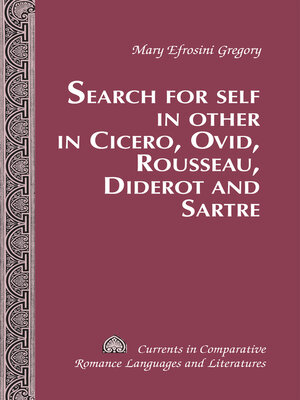Search for Self in Other in Cicero, Ovid, Rousseau, Diderot and Sartre
ebook ∣ Currents In Comparative Romance Languages and Literatures
By Tamara Alvarez-Detrell

Sign up to save your library
With an OverDrive account, you can save your favorite libraries for at-a-glance information about availability. Find out more about OverDrive accounts.
Find this title in Libby, the library reading app by OverDrive.



Search for a digital library with this title
Title found at these libraries:
| Library Name | Distance |
|---|---|
| Loading... |
Search for Self in Other in Cicero, Ovid, Rousseau, Diderot and Sartre examines how these five theorists recognized that searching for self in an idealized other can lead to a variety of perversions. Cicero warned against seeking friends whom we regard as being everything that we are not: he advised to first be a good person and then to seek other. Ovid showed that Narcissus, who had no close friends to reinforce his identity, was oblivious to his own assets and tried to live vicariously through other. Rousseau explained why modern man, while seated in a theater, feels compassion and is transported by pity, anxiety and fear for the welfare of fictional characters as if it were his own. Diderot showed how the absence of self can be exploited by the powerful to reshape the minds of the weak. He proves that given the right environment and length of time, any one of us, like the victims in The Nun, could just as easily have his life ruined. Sartre reminds us that it is impossible to be-in-exterior. We see ourselves according to the way that others perceive us based on conditioning and prejudices. Sartre untangles the snarled web of misperception of self that arises from «the look» of the other.
This book addresses man's growing understanding of the death of self in the mirror of other across the corridors of time – from Narcissus' ancient pool, to Cicero's Roman forum, to Rousseau's Parisian theater, to Diderot's convent in The Nun, to Sartre's twentieth-century hell.
This book addresses man's growing understanding of the death of self in the mirror of other across the corridors of time – from Narcissus' ancient pool, to Cicero's Roman forum, to Rousseau's Parisian theater, to Diderot's convent in The Nun, to Sartre's twentieth-century hell.







